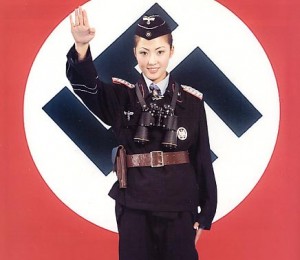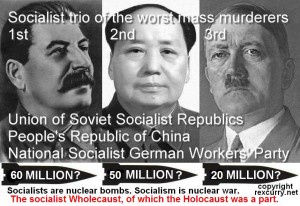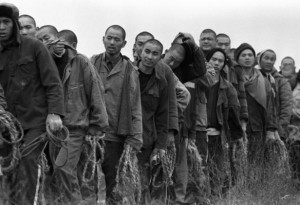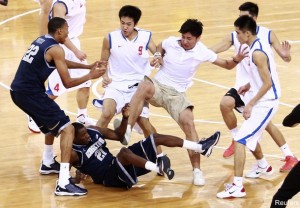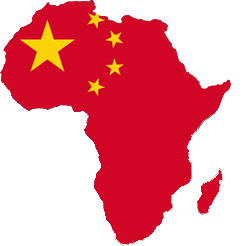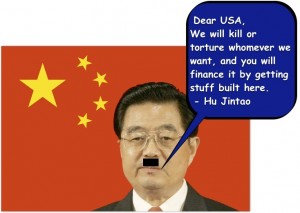by Ranbir Singh
When I first stumbled across FA Hayek’s Road to Serfdom it was over half a century after the book’s publication. The idea that socialism and communism could lead to fascism and Nazism (which after all is national socialism in the original German) flew in the face of acecpted discourse which even today puts these elements at diametric opposite ideological poles. But it was harmonious with the reality, a reality which emerged with stark brutality after the fall of communism in Europe and the former USSR. Racial pogroms agains refugees and foreigners were carried out in the former East Germany by self styled ‘national socialists’ who hated capitalism as much as those of different racial appearance. The ex-Yugoslavia was wracked by ethnic conflict and images of emaciated figures incarcerated in what were effectively concentration camps for those deemed to be of the ‘wrong’ race, sent shivers down the spines of anyone familiar with what had happened in the Second World War. Yet the atrocities were carried out not just by ultranationalist militias but by a Serbian government which was run by the same communists who had ruled Yugolavia and still called themselves the Socialist Party. The proliferation of Nazi skinheads in Russia which makes life for anyone remotely tawny skinned as literally a daily struggle of life and death cannot be divorced from the burning atmosphere of social dysfunction and resultant hate created by communism.
Right now China is heralded is the emerging economic and political power. Unlike in the USSR and its vassal states communism did not fall. The Communist Party retains power and Mao remains revered. Having crushed Tiannamen Square in 1989 Deng managed to smoothly transfer power to a new generation of pragmatic apparatchiks. Communism is said to exist in name only as China has embraced capitalism. But has it? Whole swathes of the economy remain in state hands, mostly that of the powerful military. The generous statistics put out have come under scepticism. Also even a channel as untrustworthy and pro-dictatorial as Al Jazeera News stated that the logai are important factors in keeping labour costs down to a minimal, which of course helps the competitive edge for Chinese manufactured exports because slave labour does not tend to agitate for inconvenient annoyances such as unionisation, fair pay and health and safety.
But even if communism has adapted to elements of the market there still is an ideological void to fill. Dr. BR Ambedkar, author of the constitution of an independent India, said “man cannot live by bread alone, he has a mind which needs food for thought”. And this food for thought in China is extreme nationalism, always present under Mao, now just more brazen. China likes to project itself as racially homogenous nation even if this does ignore the multiple ethnic origins of the Chinese people, forged and moulded through millennia of absorption and assimilation. In 1984 Deng Xiaoping said that reunification with Taiwan was desired because of the common racial descent of all Chinese from the primeval Yellow Emperor, Huang Di. Communist China propagates a polyglot theory of human origins in which all Chinese are descended from the Homo Erectus found in the region thousands of years ago, Peking Man. The theory of a common ancestor in Africa is rejected. In China, lineage and family remain intimately associated with biological continuity and descent based upon blood, hence with the nation. Citizenship can only be acquired through blood. But even ethnic Han Chinese are not immune from extreme social engineering. In 1989, Gansu province passed its first eugenics law to sterilise anyone regarded as insane, dull-witted and idiotic. Pollution such as drinking water contaminated by heavy metals had caused a high incidence of retardedness, eating fungus infected grain had led to Kashin-Beck disease, and cretinism was the result of iodine deficiency in the fetus.
China enjoys great legitimacy in large parts of Africa due to its past support for anti-colonial movements. Africa has the essential raw materials needed for China’s rapid economic growth. In 2006 Hu Jintao toured various African capital cities and established a China-Africa development fund to the tune of $5 million, offering preferential loans and credits, cancelling debts, providing agricultural experts, training professionals, building thirty hospitals, a hundred rural schools and increasing scholarships for African students to attend Chinese universities. China also established a new aluminium plant in Egypt, copper project in Zambia and won mining contracts in South Africa. Angola has now replaced Saudi Arabia as the largest supplier of oil to China. In addition Sudan exports half of its crude to China. Africa provides twenty percent of China’s timber imports. China has also overtaken Britain to become the continent’s third most important trading partner. China has offered favourable loans to Angola allowing the country to break its dependence on the IMF which had demanded privatisation and other stringent policies. China makes no such demands, and neither does it insist on democracy and human rights as preconditions for financial help. China has invested heavily in Africa’s infrastructure and provides an attractive alternative model to the west, emphasising strong government which eschews democracy. The Chinese are very active in Latin America, Africa, Asia and the Middle East. In November 2006 Beijing hosted the China-Africa summit. As China builds its trade links the developed world has lost many of its blue-collar jobs to this burgeoning economy. China rise has also had an adverse effect on developing countries such as Mexico and Indonesia.
But most disturbingly, the racist attitudes inherent in the communist state are exported abroad. In Africa, the expansion of commercial interests by China does not include having Chinese working under an African boss. This is after all an unequal relationship. China has a larger economy and population than the entire continent. Africa is becoming locked into unfavourable trade agreements by which it supplies the raw materials for development elsewhere. Chinese companies avoid employing natives. Sometimes as much as seventy percent of the workforce in Africa itself is Chinese. Chinese managers display negative attitudes towards Africans. In the Zambian elections of 2006 this led to reaction against Chinese dominance. In his 2008 book Africa, Richard Dowden wrote of hsi observations:
“Chinese companies bring their own Chinese workers from managers to labourers. One reason is language especially on building sites. That’s why the Tower of Babel could not be built. But asked why they don’t employ more local Africans – at least as manual workers – one Chinese minister said that the Africans were not prepared to work at night and at weekends – and did not work as hard as Chinese. Had a manager of a Western company made such a remark the sky would have fallen.”
In fact the Communist Chinese can be even more derogatory in their attitude towards Africans than white Europeans and Americans:
“These days a major component of Western business as well as aid projects is the involvement of the local people. While China funds innumerable training projects, when it comes to their own commercial operations they prefer to bring in their own workers rather than employ and train up locals. Western companies and NGOs in Africa are frequently headed by Africans, but I have yet to discover a Chinese project where Africans are in charge.”
In July 2006 six African workers were shot and wounded at the Chambishi mine in Zambia when they complained about low wages of $2 a day without any time off, dangerous working conditions, and lack of unionisation. China’s attitude that if it sells arms to genocidal regimes such as Sudan, well that is an internal matter and it has a purely business relationship with that country, is a haunting parallel of how western companies once justified doing relationship with South Africa during apartheid.
According to African-American scholar M Dujon Johnson, racism is normal in China. There is a clear hierarchy in which whites are respected and treated with deference. Darker people are treated negatively. Martin Jacques reveals how a Filipina student at Beijing University suffered horrendous racial discrimination. She was refused service at restaurants with waiters calling her stupid and was even refused entry onto a bus by the conductor in case she infect other passengers with disease. Blacks are regularly regarded as unclean. Africans in fact avoid contact with the public as much as possible. Martin Jacques, senior fellow at the London School of Economics, founder of the Leftist think tank Demos, and former editor of Marxism Today, is unsurprisingly insistent on laying the blame of Chinese racism on anything but communism. He even suggests that Mao’s Little Red Book drew upon Confucian tradition rather than Marx. Yet even he cannot ignore the obvious in his prophetically titled When China Rules the World:
“There has been a long history of discrimination against African students in China. Emmanuel Hevi, a Ghanaian who studied there in the early sixties, wrote: ‘In all their dealings with us the Chinese behaved as if they were dealing with people from whom normal intelligence could not be expected.’ In December 1988, after an incident between Chinese and Africans at Heihai University in Nanjing, there was a march by over 3,000 Chinese students to protest against the presence of African students, with demonstrations subsequently spreading to Shanghai, Beijing and elsewhere. On some of these marches, the climate was so hostile to African students that a number of universities decided to move them out of their dormitories because of a perceived threat to the physical safety. No attempt was made by the authorities to halt or prevent the demonstrations, which went on for many days, suggesting that they perhaps enjoyed a certain measure of tacit official sympathy. At Wuhan Industrial College, students marched demanding that ‘all blacks be removed from China’. According to Dujon Johnson , the race riots and demonstrations in 1988 were by no means unique: similar events occurred in Shanghai in 1979 and 1980, in Nanjing in 1979, 1980, 1988 and 1989, and in Beijing in 1982, 1983, 1984, 1985, 1987, 1988 and 1989. In September 2007 there was a report that a group of at least twenty black men, including students, tourists and the son of a Caribbean diplomat had been arrested by a team of police in black jumpsuits in a Beijing nightclub and severely beaten. A white American reported that: ‘he had never seen anything so brutal. There was blood on the streets. They were basically beating up any black person they could find.’ It should eb born in mind that a black face remains an extremely rare sight in China: in 2006 there were reported to be 600 Africans in Beijing, 500 in Shanghai, 100 in Shenzhen, and over 10,000 in Guangzhou (with a population of 12 million), mainly as a result of the growing trade with Africa. No doubt this lack of familiarity with black people may partly explain the Chinese sense of suspicion and mistrust, but it cannot be the main explanation for the deep-seated racism. Dujon Johnson’s account of the black experience in China avoids recounting his own experiences except at the very end when he writes, ‘[my experience] demonstrated to me on a daily basis how life in Chinese society is racially segregated and in many aspects similar to a system of racial apartheid.”
The visit by Condaleeza Rice to Beijing in 2008 led to flurry of racist postings on China’s nationalist websites. She was called the ugliest woman in the world, a chimpanzee, mouse excrement, and a crocodile. The 1999 bestseller China’s Path under the Shadow of Globalization by nationalist writer Wang Xiaodong, praises the rise of Chinese nationalism and a healthy return to global normality after the abnormal reverse racism which saw Chinese culture, civilisation and people as inferior during the 1980s when Chinese intellectuals looked to America for inspiration. But Wang’s racism is similar to that of Hitler. He predicts an inevitable racial conflict between China and America because the USA and its European allies are anti-Chinese and will use genetic weapons against those deemed racially different. The Hong Kong based Ding Xuneliang says racial and cultural differences will also lead to war between China and America. Race underpins this nationalist sentiment in Communist China.
Mao chaffed under Stalin, uncomfortable with having to accept a subordinate status in the communist Reich. Regarding Khruschev as a traitor to Stalinism, he used the opportunity to distance himself from Moscow. In 1960 all Soviet advisers were withdrawn. In 1969 Maoist fervour led to military clashes on the borders of the two great communist behemoths. Now the Sino-Soviet split is being updated. Putin is suspicious of Chinese machinations towards Russia’s Far East and especially towards the oil and gas reserves of former Soviet republics of Uzbekistan and Kazakhstan, as well as Siberia. China needs Russia’s oil and timber. It is suspected of having revanchist tendencies towards Russia’s far eastern region. While Putin’s rather malleable view of democracy and human rights scarcely differs from that of communism’s only remaining superpower, unlike China there is greater plutocracy and even democracy in Russia where civil society has at least not been completely stifled. Nevertheless with anti-democratic strains similar to that in neighbouring China it is perhaps unsurprising that Russia has been drawn together in an anti-American partnership with its continental rival. Following revolutions in Georgia, Ukraine and Kyrgyzstan which had anti-Russian undertones, Putin moved closer to China. But this is an axis of convenience which is tactical, expedient and opportunist and therefore not actual strategic cooperation. China is after all ascendant over Russia. The rise of China has called into question Russia’s place in the world as it becomes a junior partner to the remaining communist superpower. China is now ascendant over Russia and dismisses the latter as a great power. But it is not just Russia which should be concerned by this. Martin Jacques predicts that communism will be influenced by a revival of Confucianism to provide an alternative political model to western style democracy: centrality of state, weak civil society, authoritarian rule. He sees China’s global dominance as inevitable as he believes western role in this sphere is now permanently over. Beijing will become the new global capital. This is a new and disturbing phase in world history. China believes that its rightful place is ‘restoration’ as the world’s leading power. The last two centuries of western domination vis-à-vis Chinese stagnation were merely a historical mistake. With cultural and racial superiority now inextricably mixed, the Chinese superiority complex will confront the rest of the world. A powerful state covering one fifth of the planet is not only ethnically arrogant but views the world in terms of racial hierarchy: whites, Chinese, darker races. With overseas Chinese taking pride in the rise of the fatherland and also contributing to its economic miracle, there is talk of a Greater China, encompassing China, Hong Kong, Taiwan, Macao, Singapore and the various Chinese diaspora communities as a means of uniting the Sinic volk.
The rise of Communist China will reorder the global hierarchy of race with its strongly racist view of the world. These racial attitudes will influence world politics in a disturbing manner not least because China has no culture of anti-racism. Martin Jacques:
“The Chinese have a deeply hierarchical view of the world based on culture and race. As a consequence, the rise of China as a global superpower is likely to lead, over a protracted period of time, to a profound cultural and racial reordering of the world in the Chinese image. As China draws countries and continents into its web, as is happening already with Africa, they will not simply be economic supplicants of a hugely powerful China but also occupy a position of cultural and ethnic inferiority in an increasingly influential Chinese-ordered global hierarchy.”
Martin Jacques believes that democratisation may even make matters worse because any popularly elected government will be even more nationalistic than the Communist Party. For example support for Anschluss with Taiwan is much stronger at the popular level. He finds Chinese attitudes towards race as being too antiquated for any ideological position. Unfortunately once again his important research is compromised by his Marxist baggage which refuses to admit that communism will eventually transform into national socialism. Therefore it is not so much the Confucianisation of Communist China which is the reason for deeply disturbing racist attitudes in China. Rather it is once again the legacy of communism which has led to the rise of the Chinese Reich in all but name.
This would have resonated with Belgian postwar neo-fascist Jean-François Thiriart in the 1960s . One of his disciples was Renato Curcio of Giovare Europa, the Italian branch of Jeune Europe. He later became a leader of notorious Marxist terrorist organisation, the Red Brigade. Another adherent, Claudio Mutti, moved towards “Nazi-Maoism”. Martin A Lee in The Beast Awakens:
“Influenced by Thiriart’s political analysis, a small band of Italian militants adopted a seemingly incongruous set of heroes – Hitler, Mao, Qaddafi, and Perón – and touted slogans such as ‘Long live the fascist dictatorship of the proletariat!” and “Hitler and Mao united in struggle!’ ”
Now this has been updated with virulent anti-American revolutionaries such as Hugo Chavez who speak the language of liberation but have no patience with democracy. In this context Chavez is more than just an heir to Latin America’s revolutionary tradition. Validating Jonah Goldberg’s analysis of what constitites a ‘fascist’, Chavez has applauded the rise of intolerant nationalism and the emergence of a multipolar world which will thwart American power and neo-liberal free market capitalism. He has always been close allies of Fidel Castro. His virulent anti-Americanism has led him into the arms of national socialist style regimes of Gaddafi, Saddam and now an increasingly assertive nationalist China. The multipolar world envisioned by Chavez is shorn of American ‘imperialism’ and therefore essential liberal and democratic values. His socialist revolutionary rhetoric reaches its ultimate ideological conclusions when combined with praise for rising nationalism among nations. It is the unmistakable voice of national socialism. Venezuela is a keen ally. Chavez has expressed solidarity with China as a bulwark against American imperialism and neo-liberalism. In October 1999 he even made a pilgrimage to Mao’s grave stating that like the Chinese the people of Venezuela were beginning to stand up for themselves. China enjoys a close relationship with Iran. Even Australia is coming into the Chinese orbit, benefiting from the communist state’s economic rise, and thus drawn away from its American ally. But it is in Asia where China is supplanting American influence. The Chinese economy will eventually overtake that of America. China now sets the agenda for South-East Asia. The Shanghai stock exchange has superceded that of Hong Kong. Singapore and the Philippines have already moved closer to the communist giant. Since the Asian financial crisis of 1997 and 1998, China has invested heavily in the ASEAN countries, outpacing Japan both diplomactically and economically. Unlike Japan, China has opened its economy much wider for foreign investment. Yet brute force is never far from the scene, most notably in the dispute with Vietnam over the Spratley Islands and the invasion of that country in February 1979. Jacques blames this on the legacy of imperial China. China after all had historically hierarchical relations with its ‘barbarian’ neighbours. Hence countries in South-East Asia historically paid tribute to the emperor to show their submission. But can anyone doubt the communist contribution to China’s need for its own Anchluss and lebensraum?

